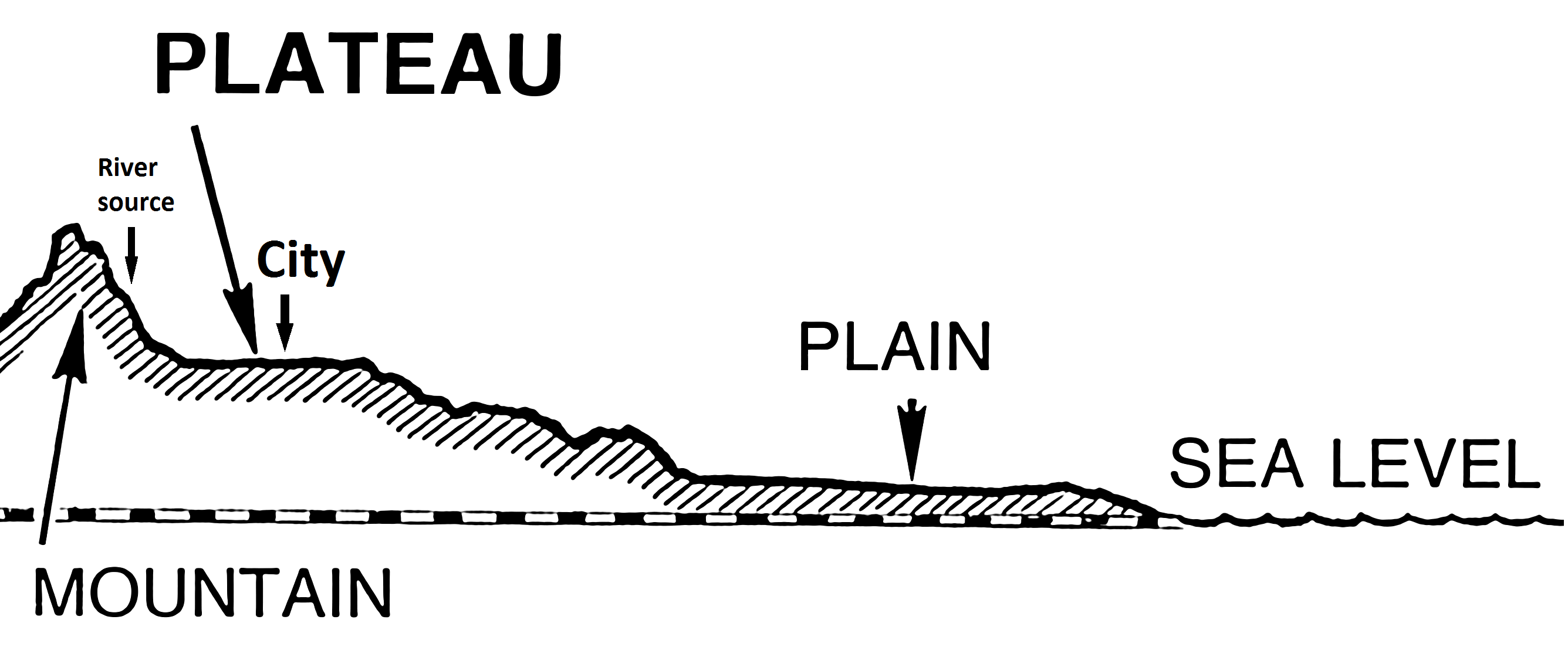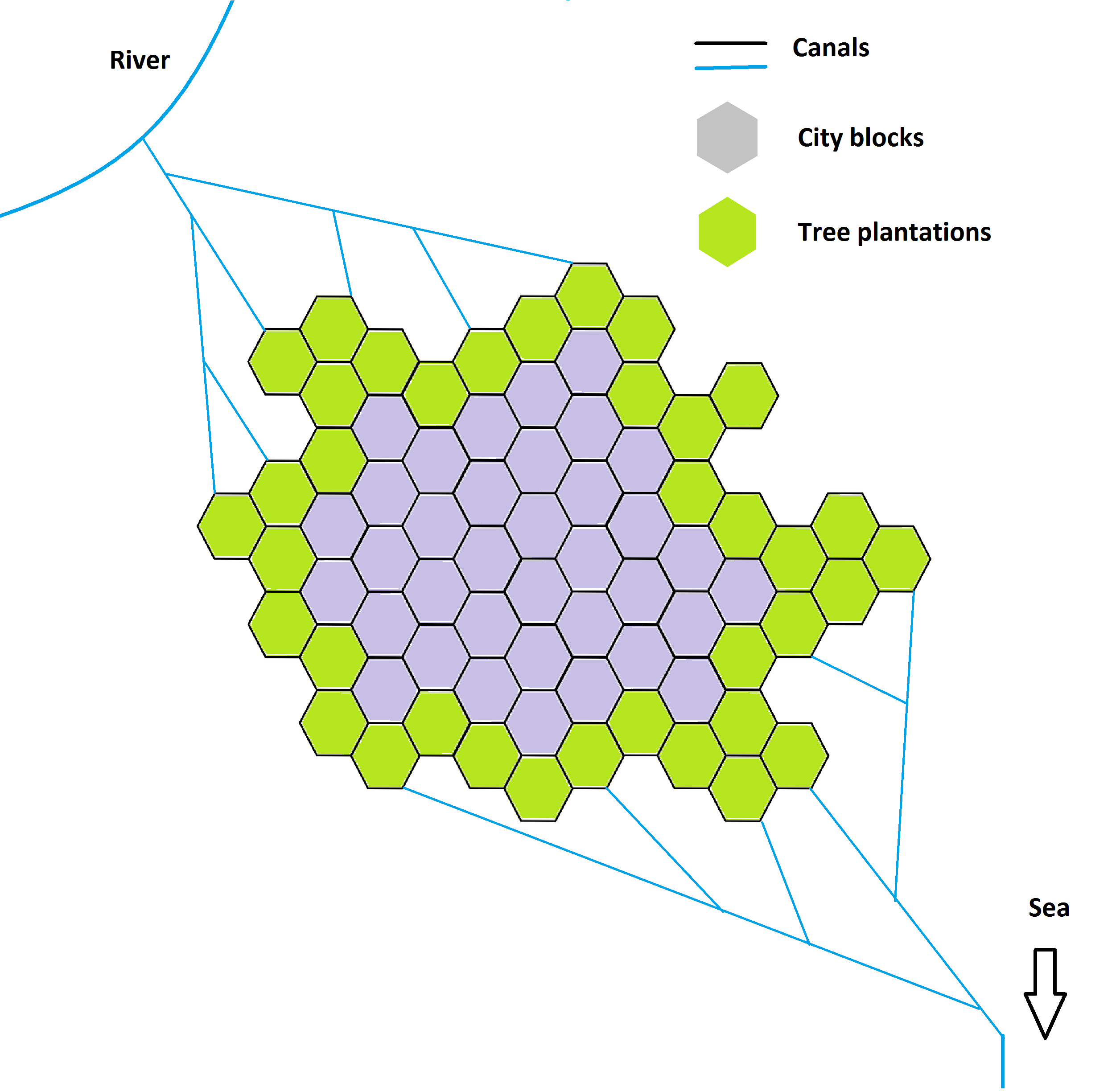Context
Six thousand years ago, magic users from Earth managed to create a portal between Earth and another planet, far far away. This planet is Earth-like but developed no life forms whatsoever.
Its new population started to terraform it, using both magic and biology. But even with magic, the process is expected to last at least ten thousand years more, and the planet still doesn't have a breathable atmosphere.
The City
Geography
The wizard planet's biggest city, and capital, was built on a plateau. The plateau is bordered on one side by a massive mountain range, and by the sea on the other.
A river, taking its source in the mountains, runs across the plateau, just next to the city.
City plan
A network of canals supplies river-water to the city and evacuate the excess water toward the sea.
The city is made of thousands of small blocks, hexagon-shaped and separated by large canals. Those canals are filled with algae, producing most of the city oxygen.
A spell maintains a tiny Earth-style atmosphere over the city. It protects it from solar radiations and prevents oxygen from escaping too much.
On the outskirts of town, this spell is a bit unstable. Sudden gusts of wind coming from outside the city can turn the air unbreathable for a few minutes at a time. That's why these areas are only used for tree plantations, and people going there have to bring special equipment with them.
Resources
From inside the city :
City blocks are multipurpose, they can support a mix of housings, vertical gardens, hospitals, markets, insect farms, schools, factories, etc. The city itself produce most of what its population needs.
Vertical gardens (buildings used as multistory greenhouses) -> Fruits, vegetables, mushrooms and oxygen.
Rooftops gardens (with beehives) & window boxes -> Flowers, wax and honey.
Insect farms -> Protein paste and silk.
Floating duck farms (they feed directly from the canals) -> Meat, eggs, feathers and leather.
Rabbits (kept in hutches inside houses and fed with peels and leftovers) -> Meat, fur and leather.
Tree plantations -> Bamboo, rubber, arabic gum, fruits, nuts, cork, oxygen and wood (in relatively small quantities).
Canals -> Oxygen and bioluminescent micro-algae, illuminating the canals at night and put in glass jars to light storefronts and houses.
River -> Fresh water and energy to power mills.
From outside the city :
Hundreds of stations are scattered around the planet and are homes to a total of more than a million habitants. Stations can take many forms, from small towns to hovering mobile factories. Their primary functions are to grow algae, jellyfish and other stuff, then inject those in the oceans, and to plant lichen and grass on the most hospitable lands. They also produce useful resources.
Sea-side stations (practice pisciculture) -> Salt, dried sea food and algae (mainly spirulina).
Mining stations -> Metals, gems and stone.
Planting stations -> Lichens and herbs, used to make dyes and medicine.
The exchanges between stations and the capital city are made using flat-bottomed "boats", made of metal and able to hover a few meters above any body of water.
From Earth
The inter-galactic portal is still active.
It's only used to do "educational travels", allowing wizard spies to study the technological progress made on Earth, to "save" gifted babies born from Earthlings and to dump the few non-wizard babies born on the wizard planet.
The portal is a well-guarded secret and can't be used for large-scale imports, or even to bring back objects bigger than a backpack.
Magic
In this universe, magic can't be used to create matter or achieve nuclear transmutation.
However, it can produce heat and light, accelerate the development of life forms, make things hover, improve physical abilities, power sentient automatons, create large-scale spells, etc.
Magic is not an infinite resource, and the vast majority of the population uses it only for the bare necessities, like heating food and charging magic batteries then sold to businesses, rich families or public institutions.
City-design problems
I'd like the space wizards capital city to have between one and two million habitants and to stay sustainable for the next ten thousand years.
A few minor problems :
The city doesn't produce cereals (Maybe legumes can take their place?), or milk.
The only source of leather is duck and rabbit skins.
The only available fabric is silk (And maybe some kind of rough fabric made of bamboo fiber).
I'm not sure white paper and cardboard can be easily produced (without using chemicals) from bamboo and/or algae.
The wood production is small relatively to the population, small enough so that lighting a fire is a luxury (But for most of its uses, wood can be replaced with bamboo, metal or stone, and in this world magic can be used to produce heat).
I'm not sure if the city needs to have electricity. Also I don't know what would be the most effective way to produce it (water mills ? wind turbines ? centrals using magic heating instead of charcoal ? ), and how they would manufacture all the equipment needed without the use of plastic, limited supplies of rubber and no modern manufacturing tools.
Those problems are not unsurmountable, but I'm afraid I missed bigger flaws in this city design.
There are certainly important resources I forgot to provide to the city, or some potential disaster I didn't think about.
The "important resources" may not be obvious (like food, water or light) but something a million-habitants city will need to keep existing for millenias.
Note : I'm not looking for methods to accelerate terraforming.
Question :
Is this city sustainable and why ?
Some useless information (it may interest someone)
I decided that the city couldn't sustain farming bigger animals (like cows, horses or pigs), but it could change if necessary.
My story starts 6 000 years after the opening of the portal, and 10 000 years before the air of the planet becomes breathable.
Here is a somewhat related question I asked a while ago
The protagonist of the story is a "normal" human, born in an aristocratic wizard family and dumped on Earth by his/her (I still haven't decided) parents.
Years later he/she is contacted by one of his/her siblings and returns to the wizard planet, only to discover that the only reason for this return is so their siblings could perform a spell.
This spell is supposed to allow them to locate their mother, who has been missing for months. It necessitates 7 children of the missing person to work, that's why they needed to get their ugly duckling back from Earth.
They don't officially accept our protagonist back in the family but disguise him/her as a servant, which allow him/her to explore the city discreetly.
The story is mostly about the protagonist running around, trying to elucidate mysterious things happening around the city and looking for a place in wizard society.


